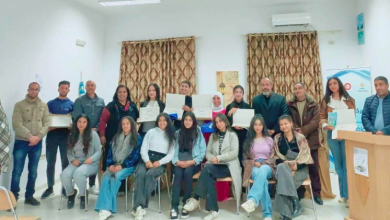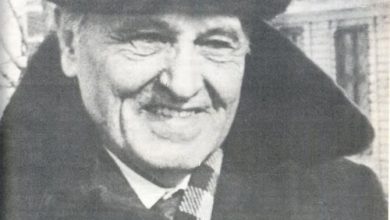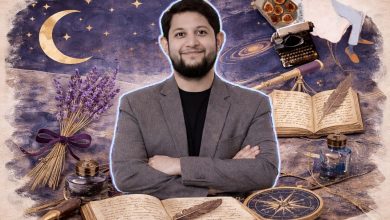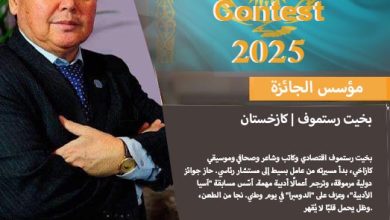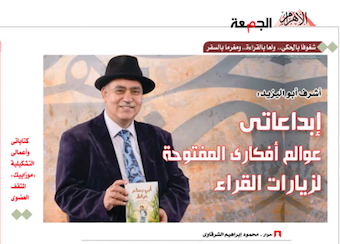
Ashraf Aboul-Yazid Talks to Al-Ahram
Passionate About Storytelling, Enamored with Reading, and Infatuated with Travel
Ashraf Aboul-Yazid: “My Creations Are Worlds of My Thoughts, Open for Readers to Visit”
— Interview by Mahmoud Ibrahim Al-Sharqawi
For the writer, poet, and translator Ashraf Aboul-Yazid, the diversity of his literary output is like a river branching across a journey—watering a field here, nurturing a garden there, or moistening a single rose in a pot on a distant balcony.
He began his literary career as a poet, publishing his first collection, Whispers of the Sea (1989), followed by The Shells (1996). In fiction, he authored Shamous (2008), Backyard Garden (2011), and The Translator (2017). His works also encompass travel writing, children’s and young adult literature, studies, and biographies.
Over the years, he has received numerous awards, including Manhae Grand Prize in Literature (Korea, 2014), the Arab Journalism Prize in Culture (UAE, 2015) and the Gold Medal at the Eurasia Literary Festival (Istanbul, 2021).
In an interview with Al-Ahram, he described his creations as personal worlds he has transformed into pilgrimage sites for readers. He views his poetry and prose as a mosaic of the organic intellectual, committed to enlightening society.
On the recent creative meeting spanning three continents, which included writers from India, Azerbaijan, Russia, Taiwan, Nigeria, China, and more, Ashraf shared:
“Every author I translate has a story worth telling. In India, my friend and poet Hemant Devati wished to translate a glimpse of his poetry into Arabic for an international festival. Reading his collection, A Monotonous Space that Evokes Melancholy, I saw an opportunity to introduce contemporary Indian poetry beyond Rabindranath Tagore or Gandhi’s diaries, which I had translated decades ago. This created a bridge to modern India, highlighting its engagement with Third World issues.
The novelist and short story writer Meyxoş Abdullah was introduced to me by our friend, writer and translator Terana Mohammed. I selected a number of his stories for publication in The Sixth Floor and Other Stories.
Through numerous literary events, I encounter new friends and ideas. I read the novella I, Cleopatra by Russian writer Inna Natcharova, which retells the historical story from an alternative perspective, enabling readers to rediscover the world of the ancient Egyptian queen.
Two years ago, I worked on a project translating four Hakka poets from Taiwan. I read the works of Miao Yi-tu, a poet and painter, and sought to introduce a new hue to Arabic literature. My translation of her poetry collection, They Are Daughters of Seraya, pays homage to her ancestors on this historic island.
The young Nigerian playwright Ester Adelana wanted to build bridges with Arabic readers through her play Ibale—a term in her native Yoruba meaning “The Broken Jar,” referring to women who lost their virginity before marriage. Interestingly, some of the Yoruba folk customs depicted resonate closely with rural Egypt.
Finally, the largest undertaking is The Epic of Eurasia by Chinese poet Cao Shui, in which he reimagines the civilizations of Central Asia and their connections to the ancient world. The project is expected to be completed early next year.”
Regarding the Silk Road Creations series, Ashraf explained the criteria for selecting writers and works:
“Selection begins with reading—the gateway to enjoying a text—followed by assessing its uniqueness, particularly when introducing an author to Arabic for the first time.”
On supervising AsiaN Arabic and MagazineIn, he added:
“I have published many translations of Asian writers, especially from South Korea, and included their works in the Silk Road Anthology, which addresses themes explored by poets—from Asia Sings to Ancient Egyptians: Contemporary Poets. In the latter collection, we read poems from across Asia about Egypt, its kings and queens, and the Nile. It is fascinating to see how an Indonesian poet or an Indian poet perceives Egypt, its river, and its ancient civilization.
In AsiaN, we introduced an Arabic Novels section, which resonated widely with readers in Asia and beyond. In MagazineIn, we published the anthology of Egyptian poets, further strengthening cultural exchange and literary dialogue.”
You are a novelist, a writer of children’s and travel literature, and a poet. Tell us about your beginnings and the cultural and intellectual influences in your work.
“Perhaps language is the primary source,” he reflects. “I have always been passionate about storytelling, enamored with reading, and fascinated by travel. I am certain these have all been essential tributaries shaping my cultural and intellectual formation.”
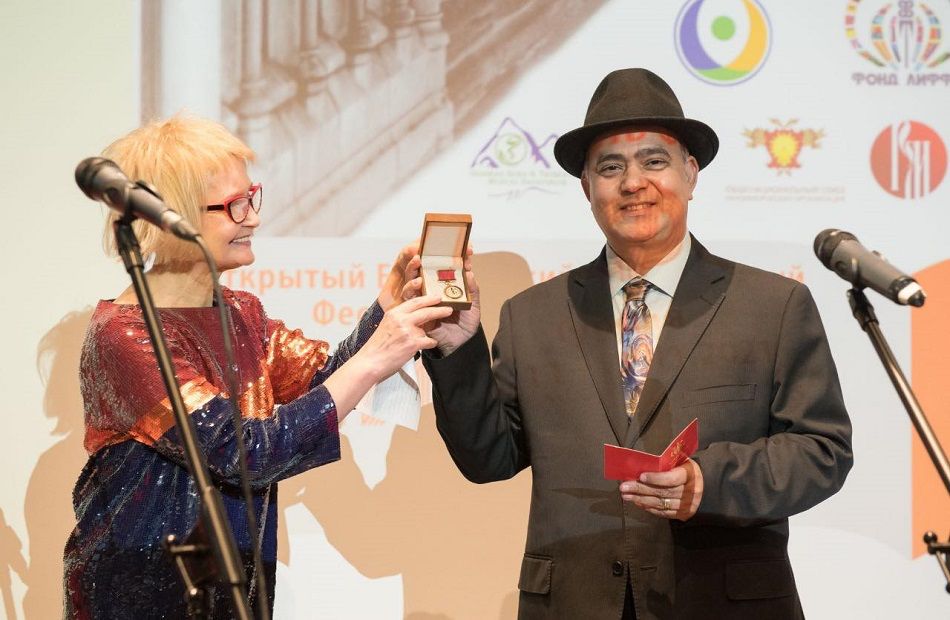
And what about visual arts criticism and translation in your creative journey? How do they relate to the diversity of your literary output?
“For anyone who works with the word, there is both a talent and a responsibility. First, one must nurture the talent, refine it through a lifelong pursuit of knowledge, from cradle to grave.
Responsibility follows—because as an organic intellectual, you do not write in a vacuum. You create worlds inhabited by your thoughts, inviting readers to explore them, embedding your vision within those worlds.
The answer to this first question manifests in those branching rivers: watering a field here, nourishing a garden there, or moistening even a single rose in a pot on some balcony.”
“I could have simply been a poet, or solely a novelist, but I felt these roles would be incomplete. I needed to complete the mosaic of writing, striving to offer the best of each form. For instance, in children’s literature, I theorized how it unites language, excitement, and knowledge, and decided it was better to provide a model myself.
Rather than criticizing others, I chose to write, so my own works might serve as a mirror of critique, contributing—even modestly—to the enlightenment I advocate.”
Your beginnings were with poetry, with your first collection, Whispers of the Sea (1989). Tell us about it, and why poetry was your starting point.
“I believe my love for the Arabic language inspired me to see poetry, with its music, as the pinnacle of linguistic creativity. My first collection was imbued with music and ideas that ignited that formative period of my life. Imagine, in middle school, I wrote composition assignments in verse!
Looking back, I see these were early experiments in versification, yet the influence of music and the power of poetry became a call to write.”
Between Whispers of the Sea and later collections like The Shells, Memory of Silence, and Memory of Butterflies, there is confession and intimate dialogue… Is that accurate?
“I matured, and so did my poetry. I am grateful to my early collections, which documented my lifelong love of literature and poetry, yet subsequent poems accompanied me along my journey, recording my growth and bearing witness to my evolving poetic experience.”
In your latest work, My Father, the Mapmaker, there are many messages and complex issues. Could you shed light on this book and its concept?
“On my way to a salon dedicated to discussing my novel for young readers, My Father, the Mapmaker, I anticipated many questions. I realized that they all stemmed from my vision of this narrative art—a vision that inevitably differs with each writer.
Passing by the obelisk in Tahrir Square, I saw a sign. I see the novel—whether for young readers or adults—as creating a square for an imagined reality, a space where four paths converge: literature, history, science, and imagination. My obelisk—the novel—stands in the literary space, drawing from these paths, which I explore to bring back what is useful for constructing the narrative, engraving it on the four faces of its obelisk.
As a novelist, I must balance everything I glean from these gardens into the crucible of the story, so it rises into the literary sky. Some writers dwell exclusively in history, others only in imagination, some revel in the subtleties and mysteries of language, and rarely is science given its due. This combination drives me; I do not see a complete novel without it. Thus comes My Father, the Mapmaker, a synthesis of all these elements—or at least, as I envisioned it.”
Why did you make the map a central motif?
“I will answer you with a line from the text,” he says: “The day will not begin without light, nor will we know the path without a map; and if the sun sends light to the day, it is our steps that draw the maps.”
The novel revives imagination, knowledge, and the relationship between identity and geography. Is the underlying purpose to strengthen the bond between future generations and their land and history?
Again, quoting the text, through the voice of an Arabic language teacher:
“Maps are the most valuable possession of nations. They mark borders that protect and defend them, ensuring the safety of their citizens. There are also treasure maps that people pursue to benefit from their wealth. Maps count buildings and farms, allowing nations to plan for their inhabitants’ future. We all live within a map; we cannot exist in a void. You cannot safeguard a house, a clinic, an office, or a restaurant without a map documenting its boundaries and protecting its rights. I am delighted that among my students I finally found someone interested in maps. If I love history, then the map is one of its most important tools, a child of its sister—geography.”
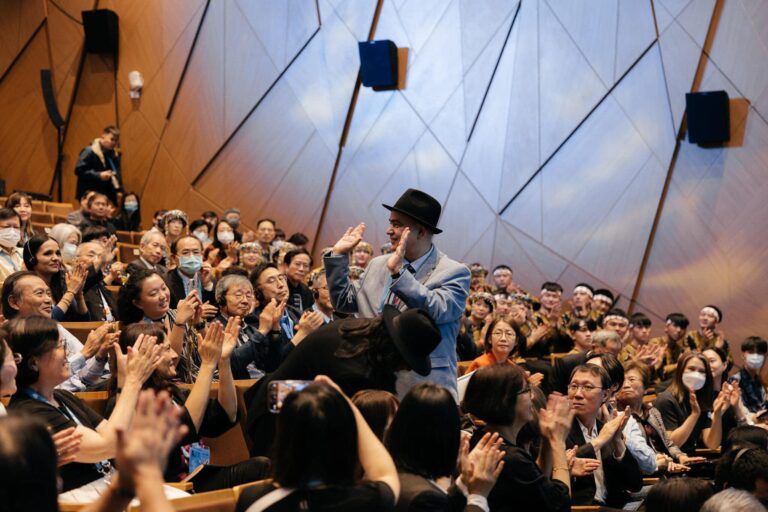 Your 2007 novel Shamous depicted Egyptian life with fast-paced scenes. Some critics described it as prophetic. How would you approach it if you rewrote it today?
Your 2007 novel Shamous depicted Egyptian life with fast-paced scenes. Some critics described it as prophetic. How would you approach it if you rewrote it today?
“This novel anticipated, in many details, events that occurred four years after its publication, earning it the label of ‘prophetic novel’ by some critics. Yet, an author does not rewrite such works—they are like documents, irreplaceable. One writes anew rather than rewriting.
While an author should avoid explaining their work, allowing readers and critics the freedom of interpretation, I was attentive to the visual dimension of my novels, as if drawing imaginary lines separating one part from another. The brisk pace was crucial, allowing the narrative to follow events that unfolded like a rolling snowball, growing and engulfing all it encountered.”
Following the rhythmic beats of Shamous, came Backyard Garden, structured into an introduction and four seasonal chapters, and then 31, with chapters numbered in reverse from thirty-one to one, where the characters bear numbers rather than names.
In my latest novel, The Translator, characters from various countries speak in monologues according to the letters of the alphabet, while the translator remains silent throughout. This experimentation is important, posing structural challenges, pushing narration beyond language and event, seeking renewal and innovation. One common thread across all these novels is their focus on human life outside one’s homeland, transforming sociological insights from academic texts into the open, provocative space of fiction.
Interestingly, I became a critic of my own novels when I analyzed them in one chapter of my doctoral dissertation (Crisis Management in the Arabic Novel and Its Social Impact) at the American University of Science and Technology (AUST).
Why did India celebrate your novel Backyard Garden and include it in their educational curriculum?
“The protagonist, translated into English and Malayalam for Indian readers, lived in the subcontinent and engaged with its culture, which fascinated her. Indian readers and scholars saw their country reflected in an Arabic text, further amplified by Sabina K. Abbas’s doctoral dissertation on Narrative Poetics in Ashraf Aboul-Yazid’s Novels. They even named the protagonist ‘Camellia’ in the local translation.”
Your early travel works, A Traveler’s Biography (2008) and A River on a Journey (2015), why do you think this genre did not gain the recognition of your novels or stories?
“Perhaps you disagree, but another academic work, Egyptian Travels to India: Ashraf Aboul-Yazid as a Model, addresses this. Travel literature may not have resonated as widely here, yet I am proud of the title Sinbad the Poet, given to me by the great Yemeni poet Abdel Aziz Al-Maqaleh, and the Contemporary Ibn Fadlan, a title bestowed in Tatarstan, where Ahmad Ibn Fadlan arrived twelve centuries ago as an emissary to the Abbasid Caliph, marking the beginning of Islam in Russia.”

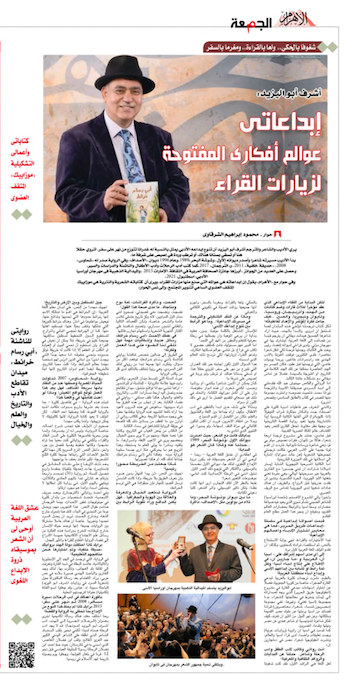 Ashraf Aboul-Yazid Talks to Al-Ahram
Ashraf Aboul-Yazid Talks to Al-Ahram